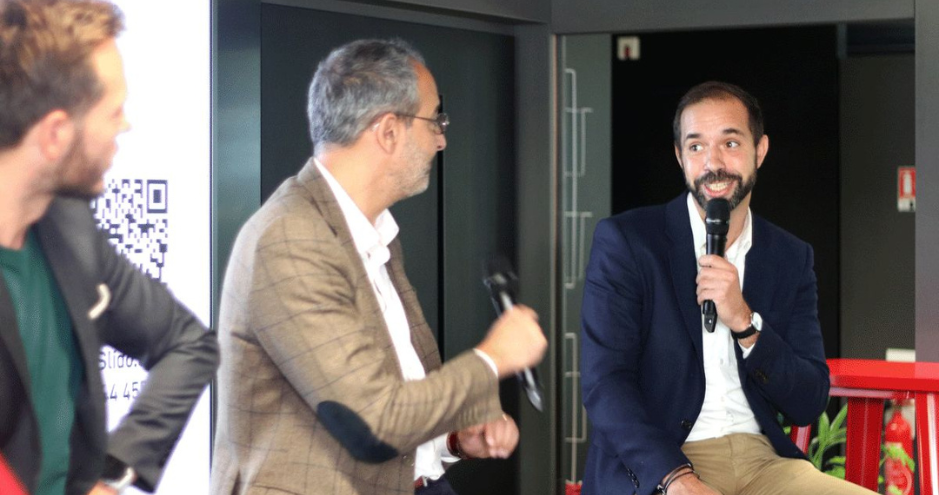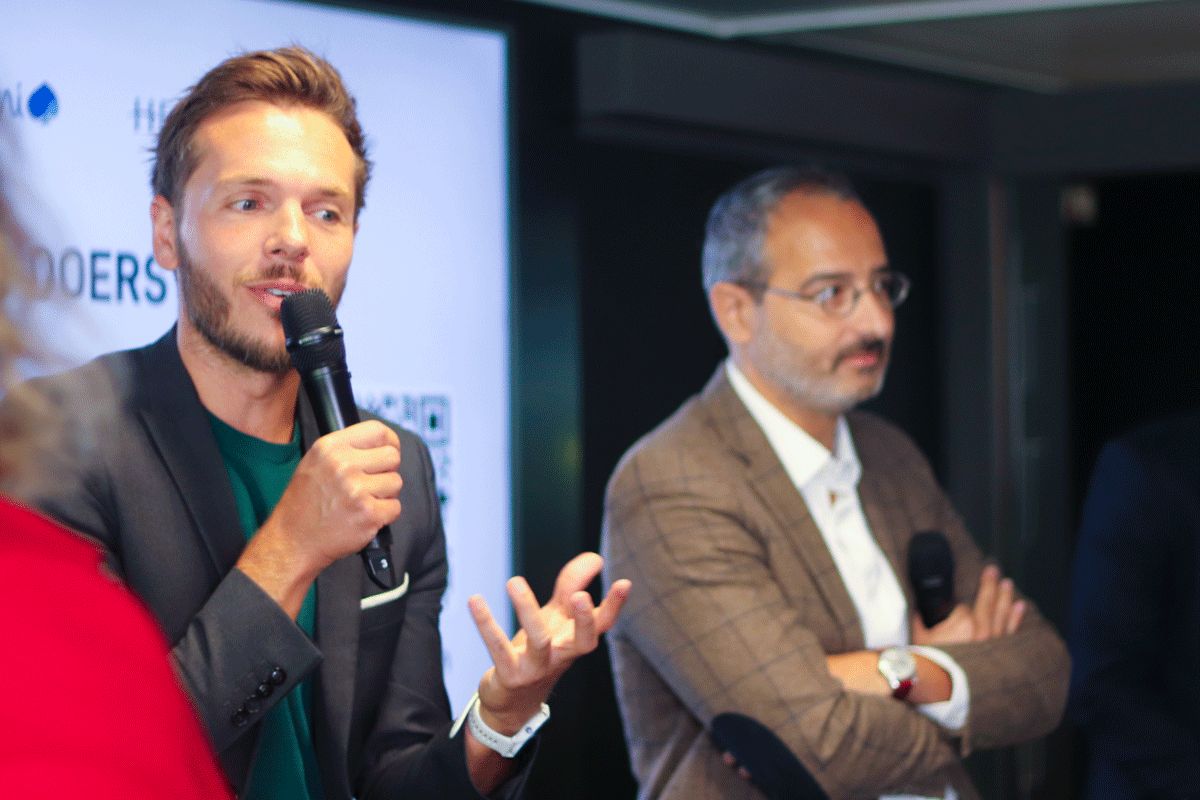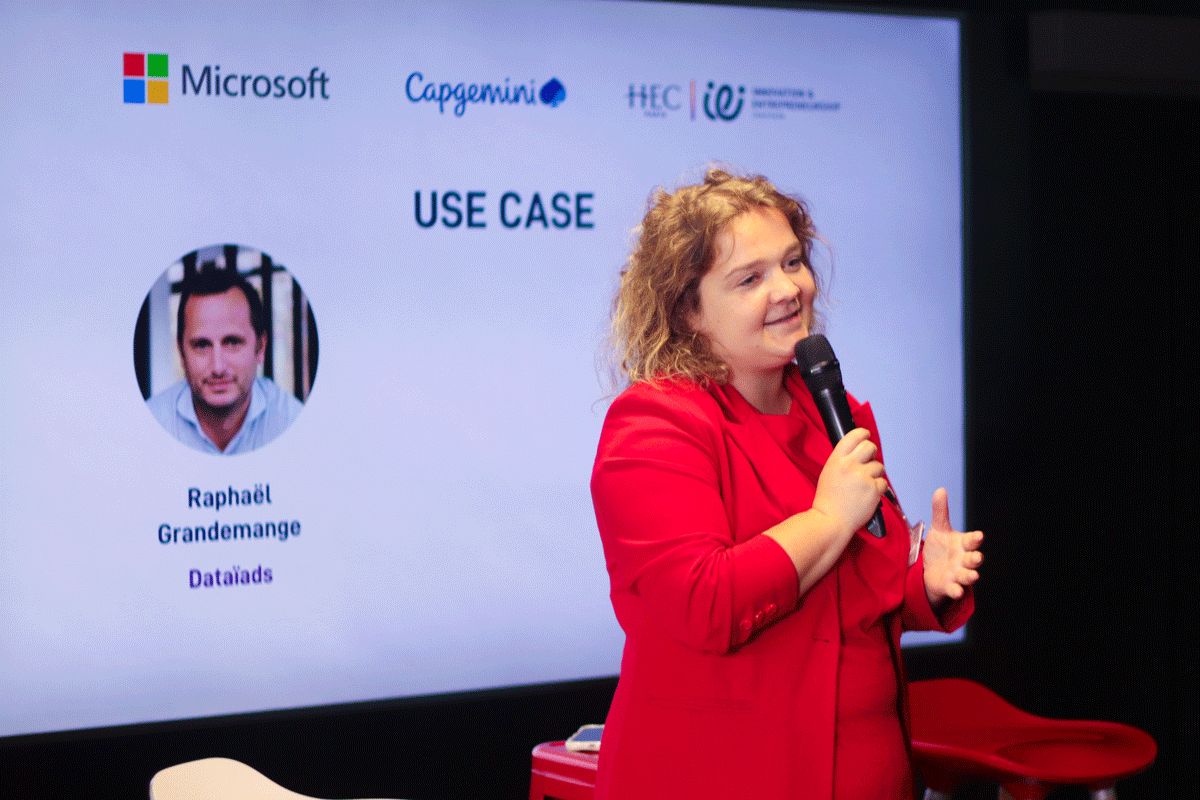How can large corporations effectively adopt AI solutions?
AI (Artificial Intelligence) has been on every lip and on many corporations’ agenda. Collaborating on an AI project with a large corporation undeniably offers a valuable opportunity for a startup. However, a few key considerations need to be kept in mind before jumping on this kind of project. To help corporations and startups successfully collaborate on AI projects, Incubateur HEC Paris has organized a new Doers to Doers session featuring insights from three experts:
- Pierre Demeulemeester, Vice President of AI & Data Strategy & Transformation at Capgemini Invent,
- Florent Pélissier, Head of the Startup Team at Microsoft,
- Hani Ramzi, CEO of Europe at Persado, an AI-Driven startup that generates content for enterprise marketers
Let’s see what these industry leaders had to share on navigating the complex landscape of AI integration within large organizations. Here is their advice based on their respective experiences.

1. Collaborating with strong internal sponsors, even a champion
Having executive sponsors within corporations who are open-minded and willing to listen can make a huge difference in the AI adoption success. According to Hani Ramzi, “having a champion who is really willing to push the solution internally and who guides the startup through all the complexity of the corporation” is highly recommended. “These sponsors can change completely and move the needle," he adds as they set the tone for their teams to onboard and leverage new AI solutions. This level of sponsorship allows the alignment of organizational objectives and facilitates the adoption of AI technology from the top down, making it more sustainable and impactful.
2. Aligning organizational needs and providing a clear value proposition
As with any business project, aligning AI solutions with the specific needs and goals of the organization is a must do. For Pierre Demeulemeester, "if an organization wants to make value with AI, they need to make their processes evolve". This entails a deep understanding of the organization's operating model and ensuring that the AI implementation fits easily. This also requires collaboration between business and IT departments from the start to create a cohesive strategy that aligns with the corporate vision. On top of this, AI solutions must offer tangible and measurable benefits to gain traction. The added value must be obvious and easy to integrate as a result.
3. Building a robust data foundation
Quick but necessary reminder: data is the driving force behind AI. Pierre Demeulemeester highlights the inextricable role of data in AI adoption: "If your client doesn't have data, you will have nothing." However, collecting data is not enough. Corporations need a robust data foundation to effectively deploy artificial intelligence, as AI models rely heavily on quality data to perform. Companies must assess their data readiness and work towards consolidating and cleaning data to support AI initiatives. Furthermore, they should ensure data compliance with regulations to mitigate risks related to data privacy and security.

4. Engaging the end-user and ensuring cultural fit
Cultural factors cannot be overlooked when it comes to AI adoption. Pierre Demeulemeester explains that without user engagement and considering the cultural fit, AI solutions risk ending up as "another solution that is not going to be used". The integration process should prioritize user experience design to facilitate seamless adoption and encourage active usage among employees. Training and change management definitely help overcome resistance and align the new technology with the organizational culture.
5. Managing risks and ensuring ethical compliance
"When you bring a new solution, you bring new risks," warns Pierre Demeulemeester. Indeed, with artificial intelligence comes new risks, such as cybersecurity threats and data biases. These risks need to be anticipated and managed. Organizations should develop comprehensive risk management strategies and ensure that AI solutions comply with ethical standards and legal regulations. This includes addressing concerns such as data protection, bias mitigation, and transparency in AI models.
6. Optimizing operational and commercial dynamics
Hani Ramzi suggests that companies should focus on the operational ease and commercial balance when integrating AI solutions. "We prefer to fail fast rather than really spending months and months chasing a given account," he mentions. Streamlining these aspects can reduce the adoption cycle and enhance the scalability of AI solutions, ultimately leading to faster and more effective implementation across the organization.
7. Leveraging AI ecosystem and innovation
Florent Pélissier shares how much he loves the vibrant AI startup ecosystem in France. “We had a lot of fundraising lately in France, with Mistral AI for example.” This rich ecosystem is a fertile soil for collaboration opportunities. Engaging with the startup ecosystem allows large corporations to access innovative solutions that they might not develop in-house. By collaborating with agile startups, organizations can adopt cutting-edge AI technologies that are tailored to their unique business challenges.
Use Case: How Fnac Darty is Leveraging AI from Startups to Drive Innovation
The event kicked off with a real-world use case, showcasing the collaboration between Emilie Arnaud, Marketing Performance Director at Fnac Darty and Raphael Grandemange, cofounder and CEO of Dataïads. This partnership serves as a prime example of how large corporations are integrating innovative AI solutions developed by startups to address specific needs.
The session highlighted Fnac Darty’s particular requirements, the tailored AI solution provided by Dataïads, and the challenges they overcame to make this integration a success.

When Emilie Arnaud noticed that Fnac Darty was facing increasing costs for online traffic acquisition—making it harder to maintain a satisfactory return on ad spend, she turned to Dataïads. This startup provided an AI-driven solution to optimize traffic by personalizing landing pages, reducing bounce rates, and boosting conversion rates.
The process from initial contact to securing a contract took over six months and was far from straightforward. However, both parties overcame the typical challenges inherent to a corporate environment. The first hurdle was winning over multiple stakeholders, particularly the IT team, which was hesitant to collaborate with new partners. "We engaged with every team member, addressing all their concerns and demonstrating the value and easy integration of Dataïads' solution," Emilie explained. The paperwork process was the next obstacle once Fnac Darty was ready to proceed. Luckily, Fnac Darty had existing procedures for collaborating with startups, which likely eased the partnership. "This phase can be boring and tedious, and doesn’t generate revenue, but it’s mandatory when dealing with large corporations," Raphaël pointed out.
Challenges continued even after the deal was finalized. The partnership kicked off with a six-month proof of concept, during which Emilie realized the importance of aligning on KPIs and measurements. "We needed consensus on success metrics. A startup might declare a project successful, but from my perspective I might not see it that way," Emilie noted.
Preparing to scale up was also a ‘sweet’ issue they had to address. "Soon enough, we faced essential questions like, 'Are we ready to scale if it works? Do we have the budget?'" Fnac Darty was ready, and so was Dataïads, which appreciated the timeline visibility provided by Fnac Darty. This transparency allowed the startup to create a clear roadmap, size their team, and determine which features needed development to cater to different clients.
To wrap the talk, Raphaël echoed Emilie's emphasis on having clear success metrics for his startup: "These metrics should cover not just performance and ROI but also solution stability, server capacity, and the overall quality of collaboration."
How is AI Really Impacting Jobs in France?
The closing session of this special edition of Doers to Doers focused on the impact of AI on employment. Many studies have explored the potential effects of technological change on the job market in France. HEC economics professor Antonin Bergeaud shared his recent research, emphasizing that understanding “whether AI primarily impacts specific tasks rather than entire jobs is essential.”
From an economic perspective, it's crucial to study AI's effects on labor productivity and employment—considering factors like reallocation, employee skill sets, and the affected professions. AI has the potential to accelerate human capital obsolescence and revolutionize work methods, raising critical questions about wage evolution and employees' bargaining power.
AI enables task automation, which could reduce labor demand in certain sectors where machines now handle specific tasks. However, AI also offers opportunities for substantial productivity gains and job creation in complementary sectors.
According to Bergeaud's research, AI’s impact on employment in France presents a complex picture. While around 20% of jobs could face significant disruption, AI brings considerable benefits, including productivity boosts and the creation of new roles.
About Incubateur HEC Paris
The Incubateur HEC Paris is a bespoke, customizable, and participatory startup support program. It leverages all the resources of the HEC ecosystem to assist talented entrepreneurs. Located at the heart of Station F, the largest startup campus in the world, the program aims to enable entrepreneurs to achieve in 3 months what they would typically reach on their own in 1 year.
About the HEC Paris Innovation & Entrepreneurship Institute
The institute supports entrepreneurs from all walks of life. Through our Incubation & Acceleration, Deeptech, and Social Entrepreneurship centers, we help students with innovative ideas, budding startups or unicorns on the rise, accelerating SMEs, large transforming companies, and social or environmental entrepreneurs to develop effectively and with impact. Here, the entire entrepreneurial ecosystem of HEC Paris converges to allow you to Make it Happen, Make it Big.